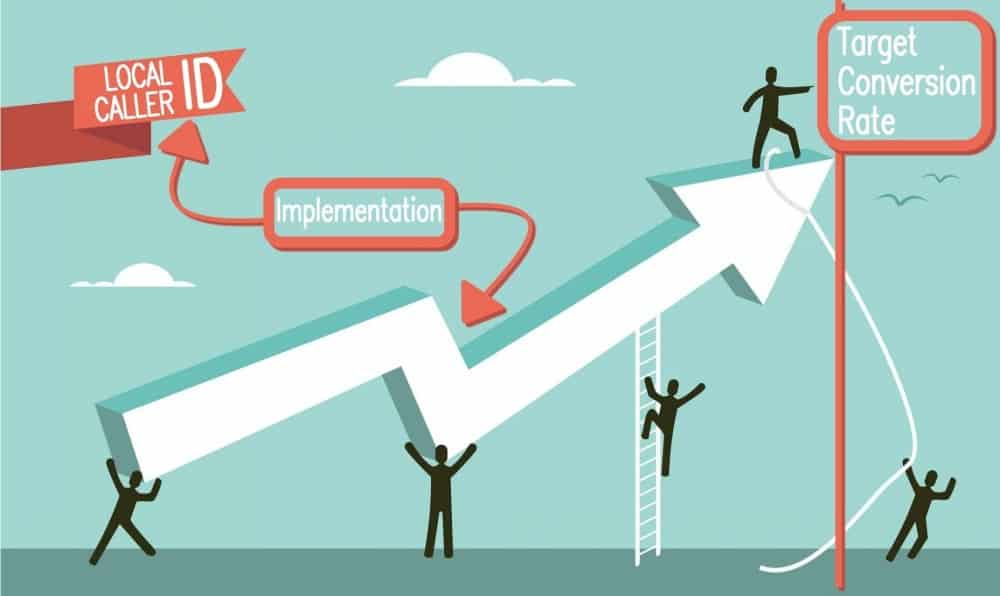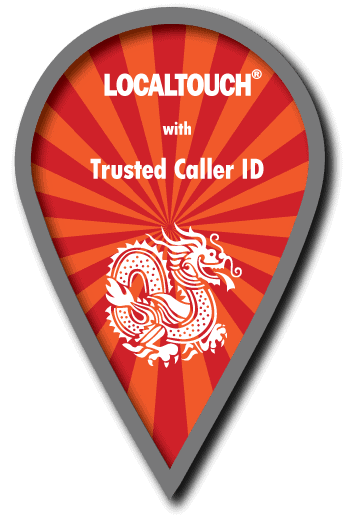Short answer: yes!
How Does Local Caller ID Increase My Conversion Rate?
Let’s look into the why and how together – first we should define the variables. Of course, lots of time businesspeople like you and me understand different things entirely when we’re talking about industry specifics.
As such, by conversion rate, we mean the rate of successful sales per numbers contacted. We don’t count just making a sales call to a number, i.e. when the call goes through.
Conversion rate = (Number of contacts reached/Number of contacts who accepted) x 100
For example; if your teams make 100 calls a day, they should be able to make contact and get information from 15-20 prospects. So the average conversion rate is 15 to 20%.
However, that still means local caller ID will increase your conversion rates. It does so by lowering the number of missed opportunities. The actual conversion still depends on your ability to pitch, yet the proportion becomes more aligned with your performance and skill.
Of course, different businesses have different goals. A smaller business might want to count any call that goes through as a conversion, simply because too many calls fail. Well, if your calls fail to reach your potential customers, you have a major problem.
One that can be fixed through local caller ID.
Local Caller ID Increases Sales Contact Rates and, in Turn, Conversions
Here’s a scenario: you have 200 numbers to call and pitch to. You use your tried and trusted system to reach out to them. But out of the 200 numbers, maybe 70 actually pick up the phone. That’s close to 130 missed opportunities.
Using local caller ID, your opportunities have a better chance of turning into contacts:
It all comes down to common sense: people are more likely to respond to a familiar number.
In turn, by installing local caller ID solutions throughout your business, you’ll see:
- More first call resolutions
- Better sale numbers for your agents
- Employee satisfaction and retention going up
- Fewer overall risks for your business
- Lower risk you’ll lose revenue
Overall operation costs also go down, since agents aren’t wasting time making calls that are never going to be answered.

Taking a Consumer Perspective
Think of it this way: you’re in the Bay area and you get a call labeled “Idaho” – even though you’ve never been and don’t know anyone there.
Then a call where you recognize the 451 area code of San Francisco. It stands to reason that you’ll go through at least a few of these steps:
- You won’t answer the Idaho call.
- You will answer the local call (what if it’s something important?).
- You will probably be annoyed by the Idaho number, so you’re going to block the number.
- If the marketers do their job poorly, they’ll keep pestering you until you reach out to your carrier to ask what’s happening.
- You put your number on the Do Not Call Registry.
- You still get called, so you sue!
As a consumer, you’re protected by the TCPA and the FTC, and the FCC. So, for one thing, the system of laws that govern telecom will always be on the consumer’s side.
Get Back to Business
Now imagine you’re the one who was making those calls. You would now have many new problems on your hands. You don’t need me to tell you it’s a dangerous life when you’re not taking the necessary steps to be TCPA compliant.
That’s why you need a local caller ID solution.

So What’s Our Solution?
We’re offering you our patented LocalTouch® – a local caller ID management system that’s TCPA compliant, comes with auto-number rotation, callback integration, and more.
While most of our competitors offer some version of local caller ID, our is a leading product in the niche because we’re also offering geo-number assignment.
Read: How Caller Name Delivery Works
Automatically Assign Numbers and Reduce Human Error
Now the way local caller ID tends to work is you get a set of local numbers for each destination you’re calling and then the agent has to make the right choice in picking the number to call.
With geo-number assignment, part of our LocalTouch® software, your agents can’t mess that up. The systems determine the closest geographical number to project as a trusted caller ID.
Is Changing Your Caller ID Illegal?
Absolutely not! Not unless you do it with the clear intent of causing harm. Changing your caller ID, also known as spoofing, is completely legal.
Make sure you’re TCPA and “Truth In Caller ID” compliant by going with NobelBiz®!
Do I Need to Pay Extra for Local Caller ID?
Most consumer and business plans charge extra fees for caller ID. To get local caller ID, businesses need to add the service to their telecom plan.
Other telecom business providers charge per number – which, if you have a giant business, is not really cost-effective. With NobelBiz®, you can get the whole package – just schedule an appointment with our business-minded sales team and they’ll custom tailor our plan to your needs.
Have more questions? Give us a call!

Michael McGuire is a contact center industry expert with almost two decades of experience in the space. His experience includes roles as Director of Contact Center Digital Transformation at NobelBiz, and as Director of Operations at FLS Connect, managing multiple call centers. As President of Anomaly Squared and Targeted Metrics, Michael successfully transitioned companies into remote operations and significantly boosted revenues. With a strong background in customer service, leadership, strategic planning, and operations management, Michael excels in driving growth and innovation in the call center space.
Mike is also a proud Board Member for R.E.A.C.H Trade Group, promoting consumer protection and satisfaction and Co-host of the Off Skripted Podcast – a show about Life, Call Centers and everything in between.







